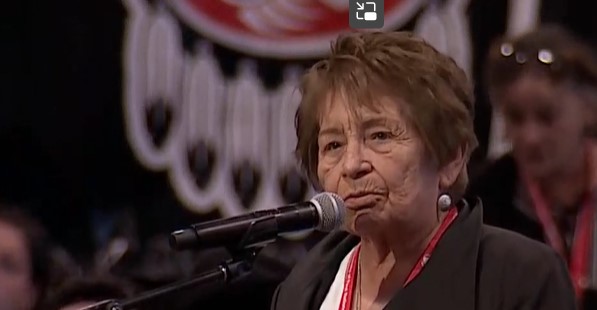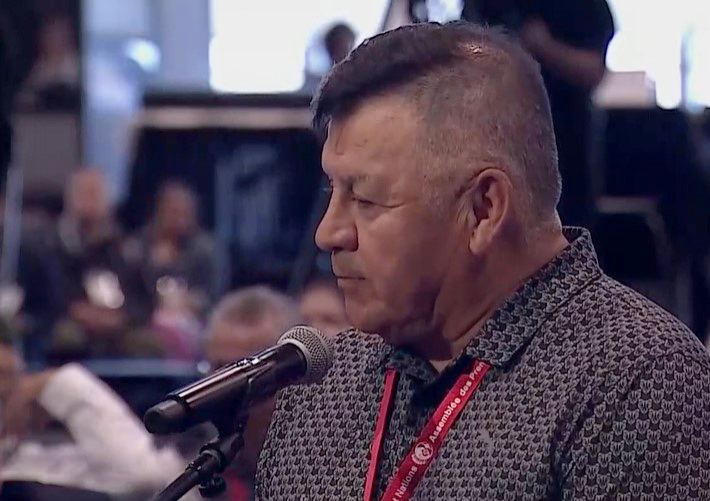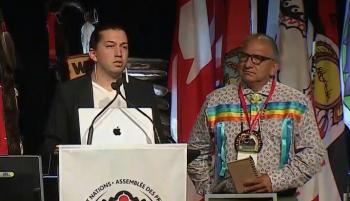Image Caption
Summary
Local Journalism Initiative Reporter
Windspeaker.com
Any changes to the charter of the Assembly of First Nations must take into consideration treaty nations, said chiefs from Alberta.
“How do we get our voice heard?” asked Cold Lake First Nation Chief Kelsey Jacko. “And when (a resolution) talks to treaty rights, I have a big issue with it.”
Twenty-three of the 25 Treaty 8 First Nations in Alberta have left the AFN. Presently Alberta, with multiple historical treaties that pre-date the province, has no regional chief representing First Nations on the AFN executive.
On Tuesday, the first day of the AFN’s three-day annual general assembly in Halifax, members of the Chiefs’ Committee on Charter Renewal presented information on the work they had undertaken to date.
The charter sets out the rules for the AFN and was adopted in 1982 as a guiding and legally-binding document for the operation and existence of the AFN.
The chiefs’ committee was created in 2017 to review the charter. However, terms of reference for the work were not approved by the AFN executive committee until 2019.
Jacko’s views have also been expressed by proxy for Tsuut’ina Nation Regena Crowchild at numerous AFN assemblies.
She voiced her concerns once more yesterday.

“Those resolutions that affect our treaty and inherent rights, how do you deal with those separate from the rest of the resolutions that affect all other chiefs?” she asked. “Because we do not give our consent and Tsuut’ina Nation has instructed AFN that you do not speak to our treaty and inherent rights.”
“Let’s figure out why AFN exists. (It) is to uphold and promote our treaty and inherent rights…and we’ve got off focus way too much in the last few years,” said Ermineskin First Nation Chief Randy Ermineskin.

That is one of the focuses that proposed changes to the charter is hoping to address, said Khelsilem, chair of the chiefs’ committee.
“We, in our country, have First Nations, and we, over the last 40 years, have all as First Nation communities grown and shifted in who we are. So one of the things we are looking at is how do we create representation for groups like treaties,” he said in reference to a question about modern treaties.
“There’s a number of nations that have done that nation rebuilding work and there’s no representation or spot (for) those types of arrangements in our structure. We want to look at ways to include that.”
Among the first questions on a survey that the committee is asking First Nations participants to respond to is whether, under the current charter, the AFN provides an “inclusive governance model” and “provides representation for all nations.”
In 2005, the AFN created a renewal commission which tabled a report with 57 recommendations. Only the recommendations that required minor modifications were implemented.
Khelsilem said the chiefs’ committee used those recommendations to inform their work in order to bring “viable recommendations” forward.
Recommendations fall under 12 categories, the majority of which deal with the governance of the advocacy organization.
“We believe it's governance, governance, governance that will enable us to redirect the work of the Assembly of First Nations. We're not here to tear the place apart. We're here to rebuild and maybe do better. I call it build better,” said the committee’s newest member Brendan Mitchell, interim regional chief for Newfoundland.
For ratification, each change will be presented individually. This process will allow individual aspects of the charter renewal to move forward even if others require further consultation.
Now, said Mitchell, funding is required to undertake the extensive work that is still required to get feedback from past and present chiefs and councillors, community members, regional councils, technical staff, advisory council members and more.
“There’s a lot of work left to be done in a little while,” said Mitchell.
He pointed to the resolution that was on the floor which directed the AFN Secretariat to “seek adequate resources…to facilitate the necessary engagement.”
Feedback will be incorporated into a final AFN charter report, which will be provided to both the executive committee and presented to chiefs at a future assembly.
While the resolution calls for the engagement on charter renewal to conclude by the December 2023 SCA, there is no timeframe as for when the work on the charter will be completed.
The resolution passed with a strong majority.
Local Journalism Initiative Reporters are supported by a financial contribution made by the Government of Canada.

